About the author: Dr Jing (William) Guo is a qualified Dutch lawyer (advocaat) and the founder of Jing Law Firm. He holds a Ph.D. from the University of Amsterdam, a Magister Juris (Master of Laws) from the University of Oxford and an LL.B. and LL.M. from Leiden University. His key areas of practice include Dutch employment law, contract law, corporate law and criminal law.
As mentioned in my previous blog, finding a good Dutch lawyer is not always easy, especially if you have never hired one before and do not have personal recommendations from your network. This can be particularly difficult for expats living in the Netherlands and for small and medium-sized international companies operating here, due to the language barrier, unfamiliarity with the Dutch legal system and differences in legal culture.
In my last blog, I shared three tips for the first steps in finding a good lawyer in the Netherlands. In this blog, I’ll explain a more systematic approach to finding a good Dutch lawyer, namely by using the official lawyer database of the Dutch Bar Association (Nederlandse Orde van Advocaten). Hopefully, this step-by-step guide will make it easier for those in need to find a suitable Dutch lawyer.
Step 1: Identify the Relevant Legal Area(s) for Your Case
Before you search for lawyers in the official lawyer database of the Dutch Bar Association, it is important to first ascertain which legal area(s) are relevant to your case. For example, if you have a conflict with your employer regarding your employment agreement, you will need a lawyer with expertise in Dutch employment law (arbeidsrecht). If you are facing criminal charges, a lawyer specialising in criminal law (strafrecht) will be required.
The Dutch Bar Association divides Dutch law into 36 legal areas (rechtsgebieden). I have translated these legal areas into English. The translated list can be downloaded via this link (https://eng.jinglawfirm.nl/wp-content/uploads/2025/03/Overview-of-legal-areas.pdf).
Every lawyer admitted to the Dutch Bar must register expertise in at least one and at most four legal areas. Identifying the key legal area(s) relevant to your case allows you to refine your search in the official lawyer database accordingly.
For individuals without a legal background, determining the appropriate legal area(s) can be challenging. If you are uncertain which area(s) apply to your situation and do not have anyone in your network who can assist you, you may consider using an AI tool, such as ChatGPT, to help identify the applicable field(s) of law. By describing your case to the AI tool and providing it with the classification of legal areas, you can receive guidance on which legal field(s) are relevant to your matter.
Step 2: Search for Lawyers Specialising in the Relevant Legal Area(s)
Once you have identified the legal area(s) related to your case, you can visit the official lawyer database of the Dutch Bar Association (https://zoekeenadvocaat.advocatenorde.nl) to start the search. The interface of this website is in Dutch, as shown below:
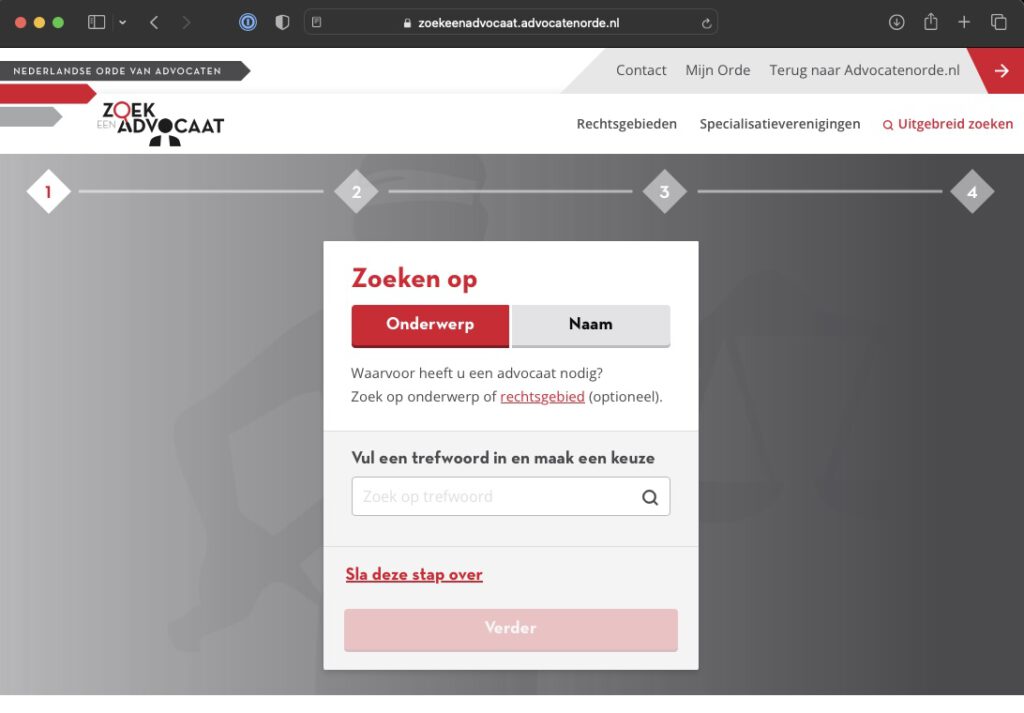
For simplicity and illustration, the explanations below are based on the following assumptions:
– You have a legal conflict with your employer regarding your employment agreement.
– You live and work in Rotterdam.
– The employment agreement with your employer is governed by Dutch law.
– You do not qualify for government-sponsored legal aid. If you are eligible for legal aid, you can contact the public interest organisation Het Juridisch Loket (https://www.juridischloket.nl) and ask for a lawyer recommendation.
It should also be noted that there are different ways to use the database and you can employ different search strategies. This blog will not be able to cover every detail. Below, I will outline a relatively simple and beginner-friendly approach to using the database.
Step 2.1: Click “Uitgebreid zoeken” (advanced search) as shown on the screenshot below:
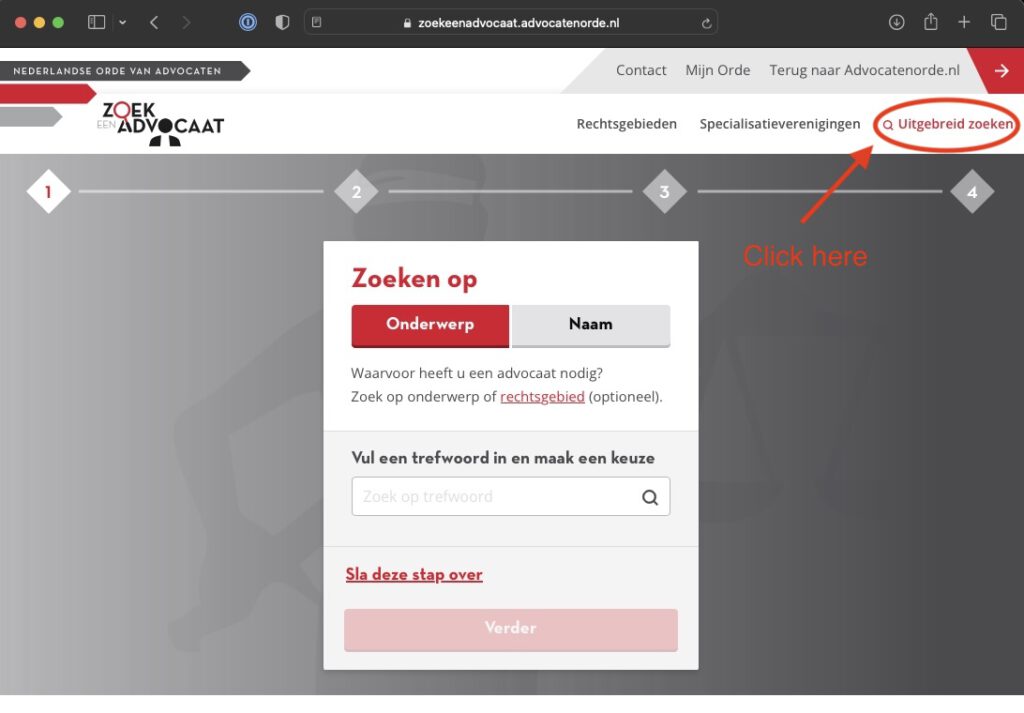
After clicking “Uitgebreid zoeken” (advanced search), you will see a list of all the legal areas as shown on the screenshot below:
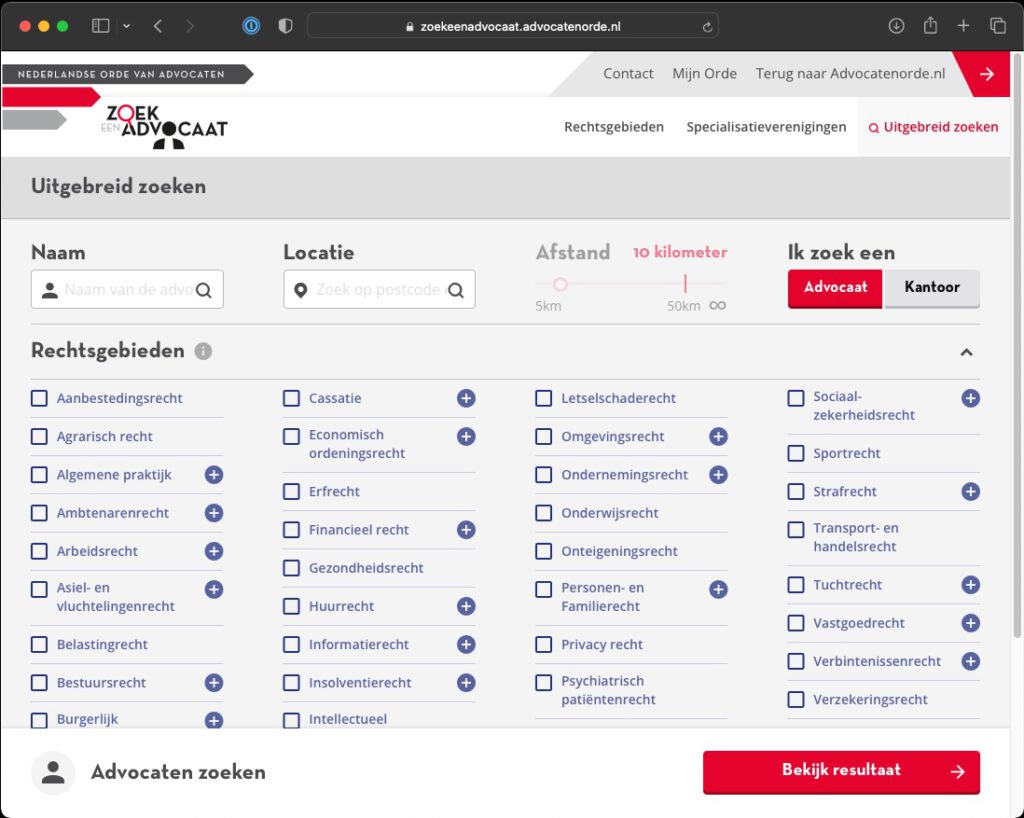
Step 2.2: Choose “Arbeidsrecht” (Employment Law) and Click “Bekijk resultaat” (See result) as shown on the screenshot below:
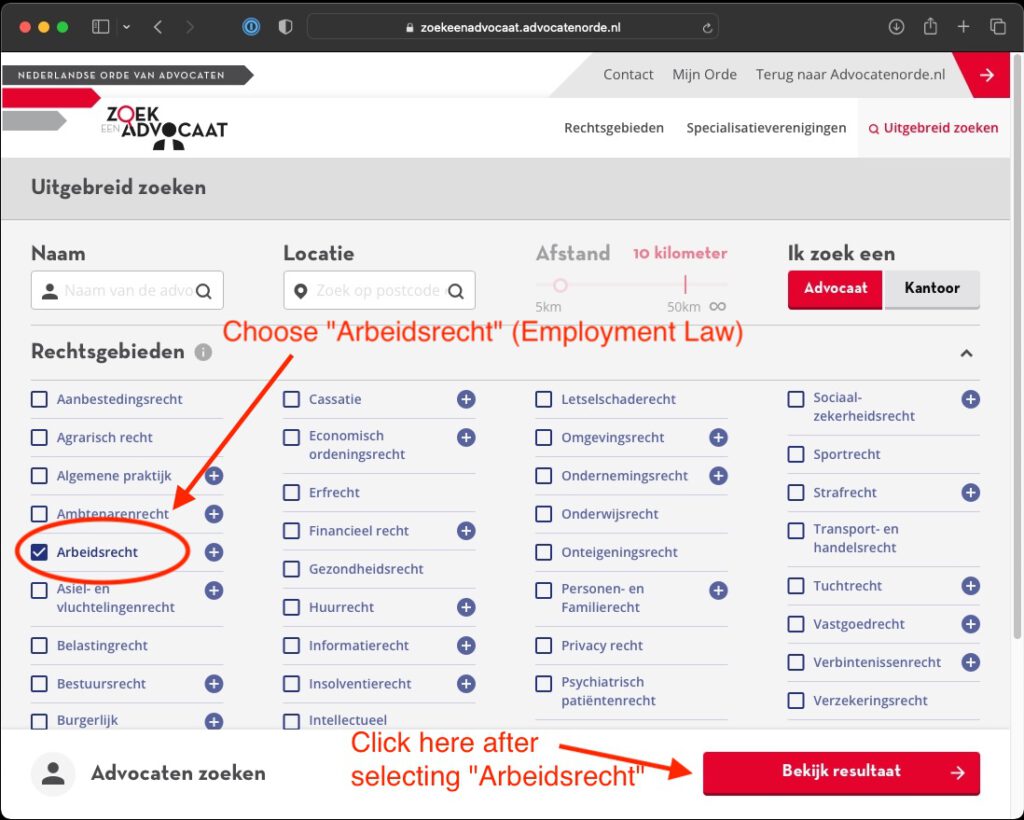
Now you will see all Dutch lawyers who have registered employment law as one of their areas of expertise. As you can see on the screenshot below, there are more than 2600 lawyers that meet this search criterion, so it will be necessary to refine the search results.
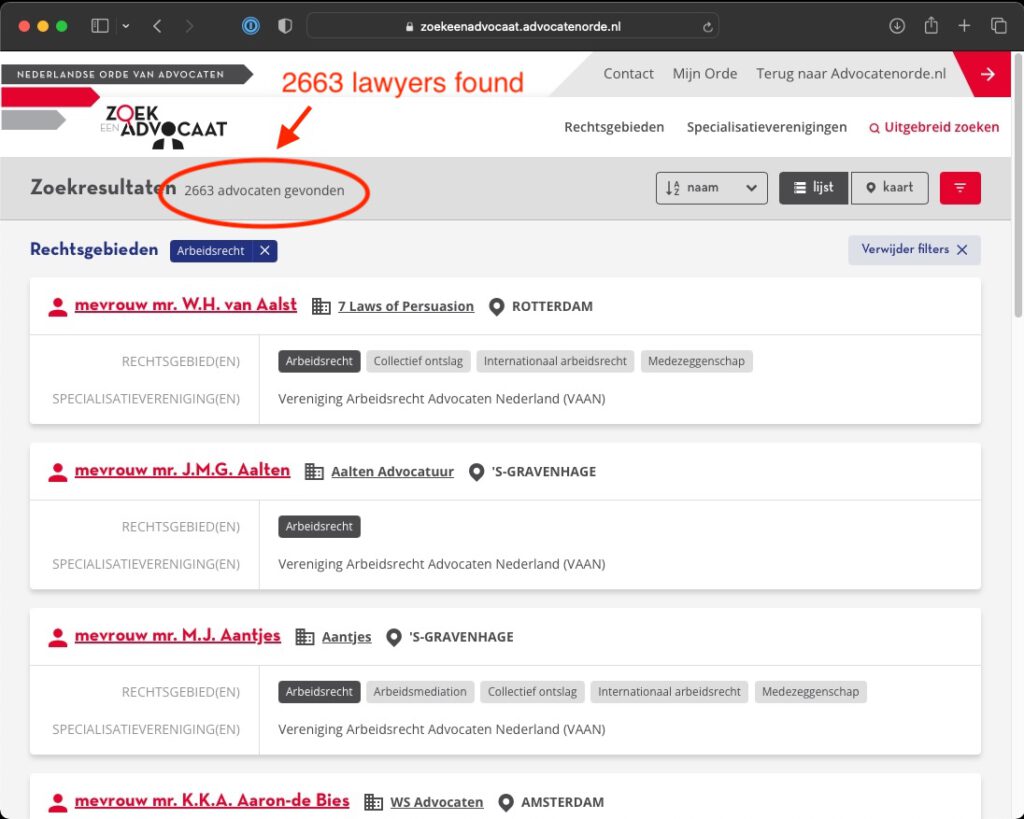
From this point, there are various strategies to narrow down the search results. One commonly used approach, which will be further explained in this blog, is to limit the search results to your place of residence.
Step 3: Filter the Search Results Based on Location
Step 3.1: Click the filter icon as shown on the screenshot below:
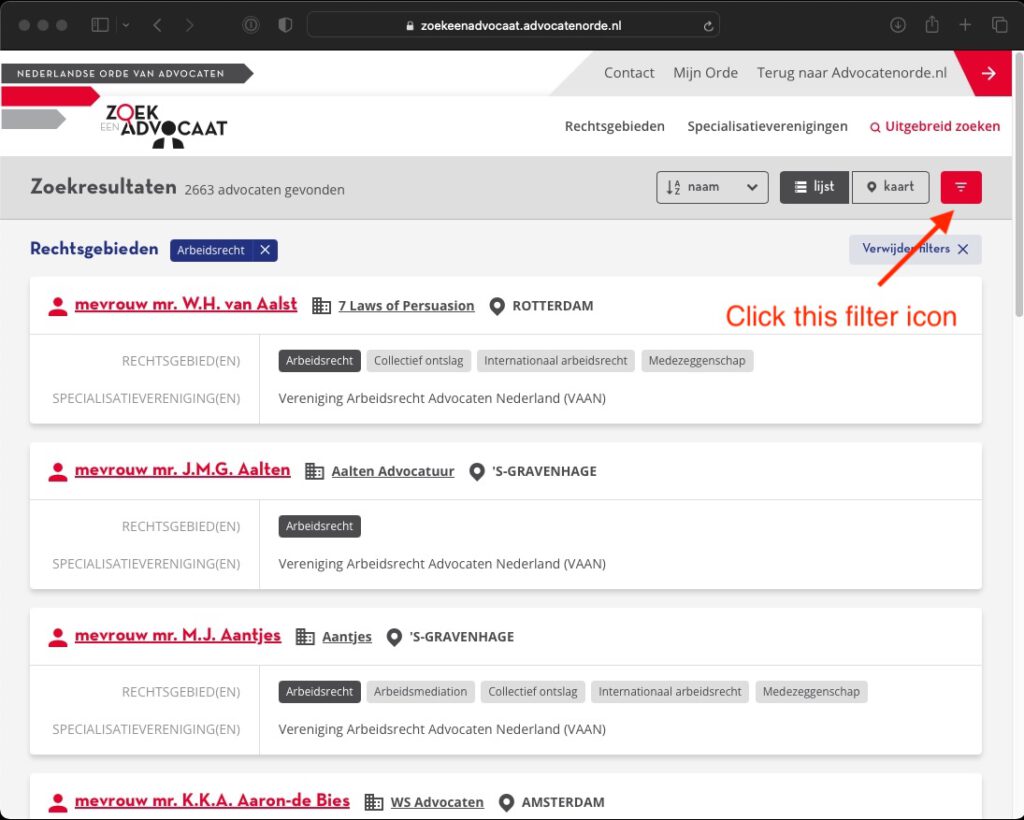
Step 3.2: Fill out your city of residence “Rotterdam” in the field “Locatie” (Location) as shown on the screenshot below:
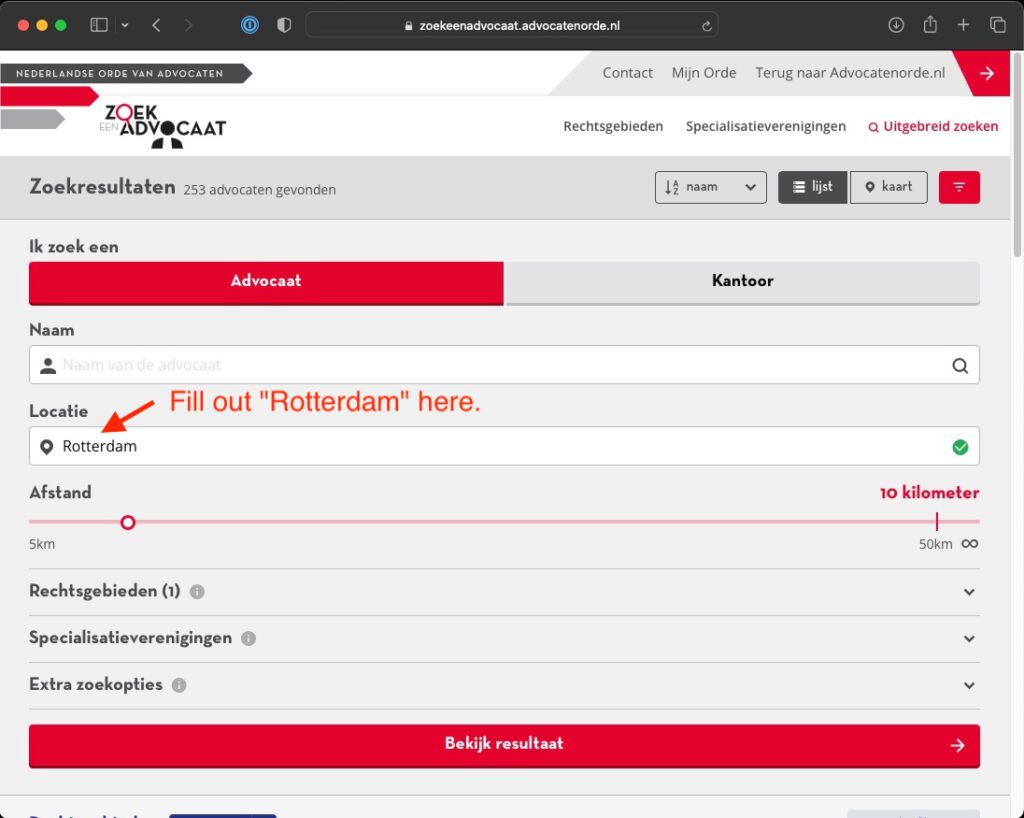
Step 3.3: Set the geographical search scope to 15 kilometres as shown on the screenshot below (you can of course set a broader or narrower scope according to your own preference) and click “Bekijk resultaat” (See result)
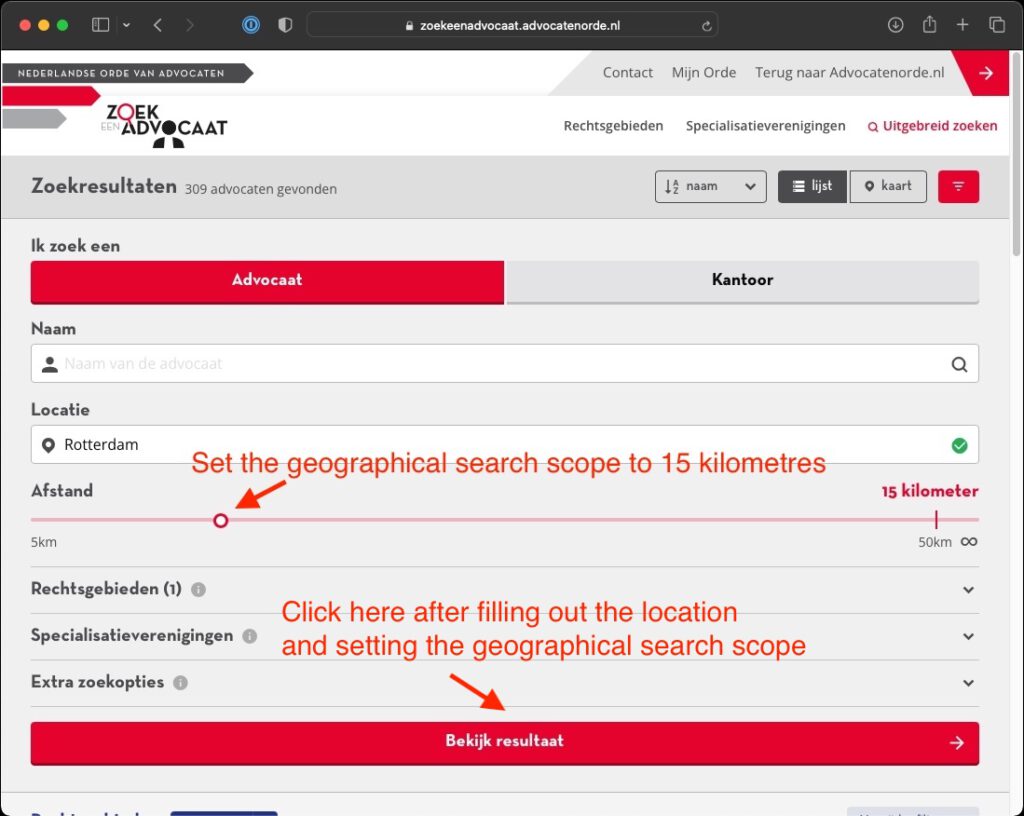
Step 4: Further Refine Search Results Using Information on the Lawyer’s Registration Page
In the above example, using the location as a filter reduced the search results to about 300 lawyers. In order to make a further selection, you will need to review the registration details of the lawyers found so far. By clicking the name of a lawyer, you will open this lawyer’s registration page, where you can find various relevant information.
For illustration purposes, I will use my own registration page (see the screenshot below) to highlight key information available about lawyers in this database
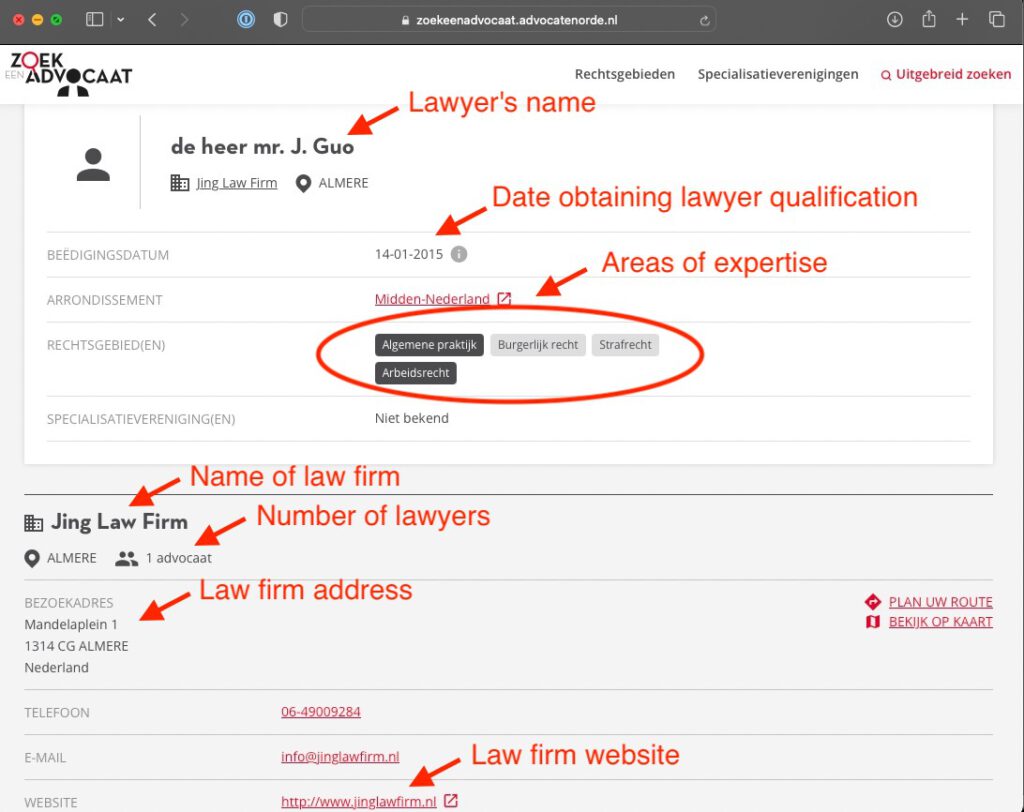
Based on the information about a lawyer found on the registration page, you can further refine the search results. Two key aspects can be particularly relevant in this regard:
– Years of practising experience. The date of obtaining a lawyer qualification as shown on the registration page is a relevant indication of a lawyer’s practising experience.
– Size of the law firm. The registration page also lists the number of lawyers at the firm. This can be an important consideration, as larger firms generally have higher hourly rates than smaller firms. Additionally, larger law firms tend to focus more on corporate clients, whereas smaller firms may be more accustomed to working with individual clients.
Step 5: Find Out More Information About the Candidates
After refining the search results based on the information found in the official lawyer database, you can select a number of candidates. Now that you have a shortlist, it may be beneficial to gather additional relevant information about the candidates. The following strategies may help:
– Reviewing the law firm’s website. Law firms typically provide profiles of their lawyers on their websites, outlining their areas of expertise, professional experience, case history and other relevant details.
– Looking online for reviews, publications and other relevant information about the candidates.
Step 6: Contact the Selected Candidates to Request an Intake Meeting or Phone Call
After narrowing down your list of candidates to a manageable number (e.g., five), you may reach out to them via email or phone to request an intake meeting or phone call. If they agree to meet or speak with you, this interaction will provide an opportunity to assess them directly. Based on these interactions, you can then make an informed decision regarding which lawyer to retain.
In the next blog, I will share some tips to help you prepare for your first intake meeting with a lawyer. Stay tuned for more insights in the next blog.